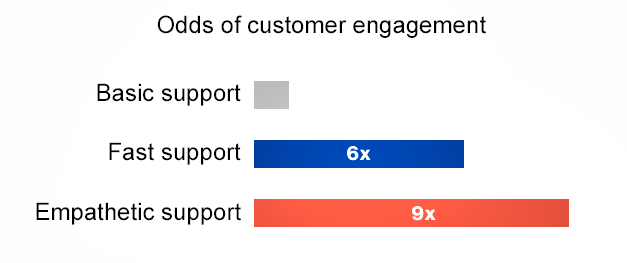-
How Speed Kills in Customer Service
Thu, 17 Sep 2015, in Customer Service
Liking this post? You might also enjoy 20 Reasons Why Businesses Fail (According to Experts)
 photo credit Gabriela Pinto
photo credit Gabriela PintoIn pursuit the unattainable, many companies are constantly pushing for faster service – correlating faster service with happier customers (and ultimately more of them.)
As customers, we are embracing speed because the accessibility and quality of information available to us is on the increase. Since speed is easy to measure and manage, shouldn’t companies that offer the fastest service win out? Perhaps – if speed were a primary measure of customer service, but it isn’t.
It’s true that fast service equals efficiency when you look at certain customer-facing businesses like McDonald’s or Starbucks. But even they are not rocket-fast. And if speed isn’t what customers want, then quicker service isn’t going to make their experience better. If Starbucks takes too much time to make coffee, will everyone leave them at the drop of a hat? Probably not.
Read More: The 4 Customer Types You Meet In Support
Consider that time is relative. You can spend five minutes on the beach or five minutes in pain. No one wants to wait five minutes talk to a support representative, but what’s being done in those five minutes can change the entire customer experience.
The point is that it’s better to focus on things other than speed if you’re looking to offer awesome customer service. Here are some of the things you can do:
Empathize with your customers
While speed is important in customer service, it’s not what makes customers stick. To demonstrate this, Gallup ran a survey on customer service in a bank and its impact on engagement.
Three types of support scenarios were established. The base case rested on the teller’s knowledge and ability to communicate policies and procedures, the second case focused on speed and clarity of service, with the third case focusing on empathy, courtesy and understanding.

It turned out that seeing the human side of the teller was more important than speed – customers were engaged with empathetic tellers twice as much as opposed to customers who only got quick service.
When support representatives offers human service, speed becomes less important as long as the issue gets resolved.
Make waiting more convenient
Unfortunately, it’s impossible to eliminate the element of time from your support process. No matter what you do, it takes time for a support agent to finish with an existing customer, listen to your request and find a solution.
Consequently, try to make waiting more convenient. Think of the car rental service Avis, where instead of waiting in line you can download an app on your smartphone and schedule a car at the location of your choice with the keys in the ignition.
When we’re working on a customer request at Helprace, we check if the question was asked in our community and if so – we link the user to the discussion to our help desk software. Our engagement has increased dramatically, particularly if the topic sees active discussion or support in the form of upvotes. Best of all, users stay on our site which is very important to us.
Teach your team to value great service
Another thing that must take precedence over speed is team culture. Take for example Jason’s Deli, a privately-held company with 250 locations. The owner, Jamie Cohen proudly says while restaurants can automate or streamline many processes to increase speed, they can’t do the same to team culture. He believes that all employees must have a goal to make every customer happy.
There’s no Wall Street money or private equity holding the company together, so we can’t bear the thought of losing a single customer.Jamie CohenAs a result, the customer-first mentality is at the core of the business. The company even implemented a hiring system that includes assessments for friendliness, hospitality, and company integrity. They also don’t like to talk about speed with their team:
Most people can be taught how to do something (fast), but it’s tough to train people to be happy.Jason’s Deli spreads this message during company meetings, manager seminars, throughout franchisees, vendors, as well as at weekly restaurant-level meetings addressing different hospitality or customer issues.
Reward good service, not fast service
Many would agree that employees should not be rewarded for speed but based on how well they do their job. Yet we constantly see top management favoring speed over quality even in the most customer-centric of industries.
McDonald’s then-CEO Jack Greenberg revealed in 1998 that unit sales increase 1% for every 6 seconds saved at the drive-thru. Burger King echoed the sentiment as they saw sales at their restaurants grow to $15,000 a year for each second shaved off order times, according to a 1999 study.
It’s no wonder Burger King and others installed drive-through timers in order to relay findings to corporate. Using this data, they rewarded restaurant managers with large bonuses, particularly if they made their way to the top few stores that did exceptionally well that year.
Whether or not corporate knew, it’s worth repeating:
Even if it takes 30 seconds to make and serve, a tasteless sandwich or rude service won’t make the customer happy. Neither will they be thrilled with a bank teller rushing them through a transaction or a service representative brushing them off and running to the next customer. Customers want their needs met with full attention and without unnecessary pressure.
Focus on making customers happy
According to conventional wisdom, the faster customers gets help, the happier they will be. Customers tend to echo this line of thinking: they keep telling us how busy they are and how they’re looking for faster service. After all, we live in a busy world full of busy people used to getting what we want.
Engagement has been proven to trump over speed, which risks acting as a disengagement point, losing the company money. This is particularly dangerous in the online world, where the lack of body language and emotion can quickly make a person feel rushed:
Thanks for contacting us, customer 389. I’ll be happy to help you as quickly as possible!Relationships play an even more important role than engagement: Gallup noted that relationships strengthen when companies communicate and meet their customer’s emotional needs. And these needs cannot be solved by faster service alone.
Despite all this, customers expect quick service anyway. Did you know that you can offer speedy service AND offer fantastic support that wins the hearts and minds of your customers?
Read More: How to Choose the Best Help Desk Software in 15 Easy Steps
Tags: customer service

